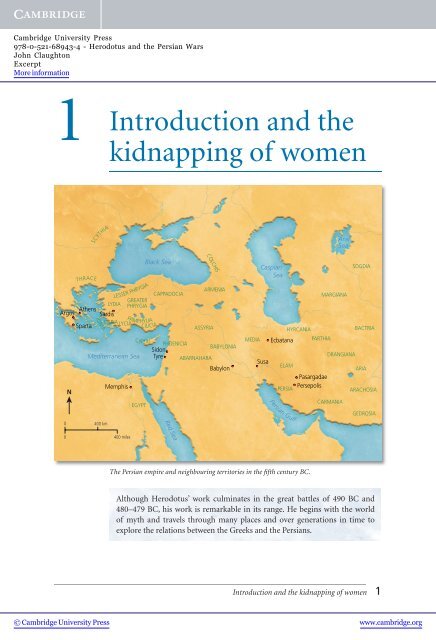1 Introduction and the kidnapping of women - Cambridge University ...
1 Introduction and the kidnapping of women - Cambridge University ...
1 Introduction and the kidnapping of women - Cambridge University ...
You also want an ePaper? Increase the reach of your titles
YUMPU automatically turns print PDFs into web optimized ePapers that Google loves.
<strong>Cambridge</strong> <strong>University</strong> Press<br />
978-0-521-68943-4 - Herodotus <strong>and</strong> <strong>the</strong> Persian Wars<br />
John Claughton<br />
Excerpt<br />
More information<br />
1<br />
0<br />
0<br />
N<br />
THRACE<br />
SCYTHIA<br />
Cyprus<br />
PHOENICIA<br />
Sidon<br />
BABYLONIA<br />
Mediterranean Sea Tyre ABARNAHARA<br />
400 km<br />
Memphis<br />
400 miles<br />
Black Sea<br />
CAPPADOCIA<br />
Argos<br />
LYDIA<br />
A<strong>the</strong>ns<br />
Sardis<br />
GREATER<br />
PHRYGIA<br />
Sparta<br />
CARIA LYCIA<br />
IONIA<br />
<strong>Introduction</strong> <strong>and</strong> <strong>the</strong><br />
<strong>kidnapping</strong> <strong>of</strong> <strong>women</strong><br />
LESSER PHRYGIA<br />
PAMPHYLIA<br />
EGYPT<br />
CILICIA<br />
Red Sea<br />
COLCHIS<br />
ASSYRIA<br />
ARMENIA<br />
Babylon<br />
MEDIA<br />
Caspian<br />
Sea<br />
Susa<br />
HYRCANIA<br />
Ecbatana PARTHIA<br />
ELAM<br />
PERSIA<br />
Persian Gulf<br />
The Persian empire <strong>and</strong> neighbouring territories in <strong>the</strong> fi fth century BC.<br />
Pasargadae<br />
Persepolis<br />
Aral<br />
Sea<br />
MARGIANA<br />
DRANGIANA<br />
CARMANIA<br />
SOGDIA<br />
BACTRIA<br />
ARIA<br />
ARACHOSIA<br />
GEDROSIA<br />
Although Herodotus’ work culminates in <strong>the</strong> great battles <strong>of</strong> 490 BC <strong>and</strong><br />
480–479 BC, his work is remarkable in its range. He begins with <strong>the</strong> world<br />
<strong>of</strong> myth <strong>and</strong> travels through many places <strong>and</strong> over generations in time to<br />
explore <strong>the</strong> relations between <strong>the</strong> Greeks <strong>and</strong> <strong>the</strong> Persians.<br />
<strong>Introduction</strong> <strong>and</strong> <strong>the</strong> <strong>kidnapping</strong> <strong>of</strong> <strong>women</strong><br />
© <strong>Cambridge</strong> <strong>University</strong> Press www.cambridge.org<br />
1
<strong>Cambridge</strong> <strong>University</strong> Press<br />
978-0-521-68943-4 - Herodotus <strong>and</strong> <strong>the</strong> Persian Wars<br />
John Claughton<br />
Excerpt<br />
More information<br />
<strong>Introduction</strong><br />
This is <strong>the</strong> presentation <strong>of</strong> <strong>the</strong> enquiry <strong>of</strong> Herodotus <strong>of</strong> Halicarnassus. The<br />
purpose <strong>of</strong> this work is to ensure that <strong>the</strong> actions <strong>of</strong> mankind are not rubbed<br />
out by time, <strong>and</strong> that great <strong>and</strong> wondrous deeds, some performed by <strong>the</strong> Greeks,<br />
some by non-Greeks, are not without due glory. In particular, <strong>the</strong> purpose is to<br />
explain why <strong>the</strong>y waged war against each o<strong>the</strong>r. 5<br />
enquiry this is a translation <strong>of</strong> <strong>the</strong> Greek word, historie: its related verb means ‘to ask a<br />
question’. Thus, Herodotus’ work is not necessarily history in our narrow sense. It can be<br />
about anything that he can find out through asking questions.<br />
Herodotus <strong>of</strong> Halicarnassus Herodotus identifies himself <strong>and</strong> his origins in what are in<br />
<strong>the</strong> Greek <strong>the</strong> first two words <strong>of</strong> his narrative. He is no impersonal or invisible narrator<br />
but a narrator whose character <strong>and</strong> judgements <strong>and</strong> opinions are constantly visible.<br />
Halicarnassus is one <strong>of</strong> <strong>the</strong> great cities <strong>of</strong> Ionia, modern-day Bodrum on <strong>the</strong> sou<strong>the</strong>rn coast<br />
<strong>of</strong> modern Turkey. The Greeks colonized <strong>the</strong> east coast <strong>of</strong> <strong>the</strong> Aegean around 1000 BC <strong>and</strong><br />
<strong>the</strong> cities <strong>the</strong>y founded <strong>the</strong>re, like Miletus <strong>and</strong> Ephesus, became some <strong>of</strong> <strong>the</strong> great cities <strong>of</strong><br />
<strong>the</strong> Greek world. It was also <strong>the</strong>se cities that were closest to <strong>the</strong> non-Greek world <strong>of</strong> Lydia<br />
<strong>and</strong> Persia.<br />
by <strong>the</strong> Greeks, some by non-Greeks ‘non-Greeks’ translates <strong>the</strong> Greek word barbaroi. It<br />
was used to describe non-Greek speakers perhaps because <strong>the</strong>ir language sounded like <strong>the</strong><br />
bleating <strong>of</strong> sheep. Although <strong>the</strong> word comes to mean barbarian in our sense <strong>of</strong> uncivilized,<br />
that is not what it meant to Herodotus. One <strong>of</strong> his great strengths is that his account does<br />
present both sides <strong>of</strong> <strong>the</strong> world <strong>and</strong> both sides <strong>of</strong> <strong>the</strong> war. Indeed, <strong>the</strong>re is more time<br />
<strong>and</strong> space given over to <strong>the</strong> non-Greek world, <strong>and</strong> Plutarch, a Greek writer <strong>of</strong> <strong>the</strong> second<br />
century AD, criticizes Herodotus for being philobarbaros, a lover <strong>of</strong> <strong>the</strong> barbarian. From<br />
now on barbaros is translated as ‘barbarian’ for <strong>the</strong> sake <strong>of</strong> simplicity.<br />
glory <strong>the</strong> Greeks are immensely conscious <strong>of</strong> <strong>the</strong> need to preserve <strong>the</strong> greatness <strong>of</strong><br />
human achievement. The purpose goes back to Homer’s Iliad <strong>and</strong> Odyssey, <strong>the</strong> first works<br />
<strong>of</strong> Greek literature, written down towards <strong>the</strong> end <strong>of</strong> <strong>the</strong> eighth century BC. Achilles <strong>and</strong><br />
<strong>the</strong> o<strong>the</strong>r heroes at Troy fight to win <strong>and</strong> fight for honour, but <strong>the</strong>y are also fighting for<br />
glory (kleos), <strong>the</strong> chance to be remembered long after <strong>the</strong>y are dead. As Hector says in Iliad<br />
7.81–91, when he challenges Ajax to single combat:<br />
And if I kill him, <strong>and</strong> Apollo grants my prayer, I shall strip his armour <strong>and</strong> carry it back<br />
to sacred Ilios, <strong>and</strong> hang it in dedication at <strong>the</strong> temple <strong>of</strong> Apollo <strong>the</strong> far-shooter, but<br />
his body I shall return to <strong>the</strong> well-benched ships, so that <strong>the</strong> long-haired Achaians<br />
can give <strong>the</strong> rites <strong>of</strong> burial <strong>and</strong> heap a mound for him by <strong>the</strong> broad Hellespont.<br />
And people will say, even men <strong>of</strong> generations not yet born, as <strong>the</strong>y sail by over <strong>the</strong><br />
sparkling sea in <strong>the</strong>ir many-benched ships: ‘This is <strong>the</strong> mound <strong>of</strong> a man who died<br />
long ago. He was <strong>the</strong> greatest <strong>of</strong> men, <strong>and</strong> glorious Hektor killed him.’ This is what<br />
<strong>the</strong>y will say: <strong>and</strong> my glory will never die.<br />
Translation by J. M. Hammond<br />
why perhaps this word represents <strong>the</strong> beginning <strong>of</strong> <strong>the</strong> writing <strong>of</strong> history as we conceive<br />
it. Events can be remembered <strong>and</strong> recorded, but Herodotus brings <strong>the</strong> purpose <strong>of</strong> explaining<br />
<strong>the</strong> causes <strong>of</strong> events. Although his approach to narrative is <strong>of</strong>ten through <strong>the</strong> telling <strong>of</strong><br />
stories ra<strong>the</strong>r than specific analysis, <strong>the</strong> stories are his way <strong>of</strong> exploring causation.<br />
2 <strong>Introduction</strong> <strong>and</strong> <strong>the</strong> <strong>kidnapping</strong> <strong>of</strong> <strong>women</strong><br />
© <strong>Cambridge</strong> <strong>University</strong> Press www.cambridge.org
<strong>Cambridge</strong> <strong>University</strong> Press<br />
978-0-521-68943-4 - Herodotus <strong>and</strong> <strong>the</strong> Persian Wars<br />
John Claughton<br />
Excerpt<br />
More information<br />
The <strong>kidnapping</strong> <strong>of</strong> <strong>women</strong> 1.1–5<br />
1.1 Learned Persians say that <strong>the</strong> Phoenicians were responsible for <strong>the</strong> falling out.<br />
Their account is that <strong>the</strong> Phoenicians came to this sea from what is called <strong>the</strong> Red<br />
Sea <strong>and</strong> settled in <strong>the</strong> l<strong>and</strong> that <strong>the</strong>y occupy to this day. They undertook great sea<br />
voyages, carrying cargo from Egypt <strong>and</strong> Assyria. They visited o<strong>the</strong>r countries <strong>and</strong><br />
<strong>the</strong>y also came to Argos. At this time Argos was pre-eminent amongst all <strong>the</strong> cities<br />
in <strong>the</strong> l<strong>and</strong> which is now called Greece. When <strong>the</strong> Phoenicians got to Argos, <strong>the</strong>y<br />
laid out <strong>the</strong>ir goods for sale. On <strong>the</strong> fifth or sixth day after <strong>the</strong>ir arrival, when <strong>the</strong>y<br />
had sold almost everything, lots <strong>of</strong> <strong>women</strong> came down to <strong>the</strong> shore, including <strong>the</strong><br />
king’s daughter. Her name – <strong>and</strong> <strong>the</strong> Greeks agree on this – was Io, <strong>the</strong> daughter<br />
Learned Persians Herodotus begins with <strong>the</strong> world <strong>of</strong> myth, which was central to <strong>the</strong><br />
minds <strong>of</strong> <strong>the</strong> ancient Greeks. This is not, in itself, an unexpected place to start. However,<br />
it is strange that Herodotus should start, <strong>and</strong> largely stay, with what he claims to be a<br />
Persian account <strong>of</strong> Greek myth. It is also strange that <strong>the</strong>se myths, normally full <strong>of</strong> wonders<br />
<strong>and</strong> metamorphosis, should be told in a deliberately realistic way. All <strong>of</strong> this narrative is<br />
presented in indirect speech, making it clear that it is meant to be <strong>the</strong> Persian account: it<br />
is specifically not Herodotus’. Despite making <strong>the</strong> stories seem realistic, Herodotus does<br />
refer obliquely to <strong>the</strong> better-known versions <strong>of</strong> <strong>the</strong> stories: <strong>the</strong> Greek reader would know<br />
what he meant.<br />
Phoenicians <strong>the</strong> Phoenicians occupied <strong>the</strong> l<strong>and</strong> which is now part <strong>of</strong> Syria <strong>and</strong> Lebanon:<br />
<strong>the</strong>ir two great ports were Tyre <strong>and</strong> Sidon. They were <strong>the</strong> great seafarers <strong>and</strong> traders <strong>of</strong><br />
<strong>the</strong> eastern Mediterranean who also founded colonies in <strong>the</strong> western Mediterranean,<br />
Carthage <strong>and</strong> Cadiz. The Greeks’ great debt to <strong>the</strong> Phoenicians was <strong>the</strong>ir alphabet; <strong>the</strong><br />
Greeks adapted it towards <strong>the</strong> end <strong>of</strong> <strong>the</strong> eighth century BC, when <strong>the</strong>y came into contact<br />
with <strong>the</strong>m through trade. See 5.58 for Herodotus’ account <strong>of</strong> <strong>the</strong> Greeks’ taking <strong>of</strong> <strong>the</strong><br />
Phoenician alphabet.<br />
to this sea Herodotus means <strong>the</strong> Mediterranean: <strong>the</strong> Greeks not only occupied mainl<strong>and</strong><br />
Greece, <strong>the</strong> isl<strong>and</strong>s <strong>of</strong> <strong>the</strong> Aegean <strong>and</strong> Ionia, but also sent out colonies to Sicily, sou<strong>the</strong>rn<br />
Italy <strong>and</strong> beyond.<br />
Egypt <strong>and</strong> Assyria <strong>the</strong>se were <strong>the</strong> two great <strong>and</strong> prosperous empires <strong>of</strong> <strong>the</strong> time before<br />
<strong>the</strong> Persian empire. The location <strong>of</strong> Phoenicia meant that <strong>the</strong> Phoenicians were ideally<br />
placed to transport <strong>the</strong> goods <strong>of</strong> <strong>the</strong>se two largely l<strong>and</strong>-locked countries.<br />
Argos a city-state in <strong>the</strong> north-east <strong>of</strong> <strong>the</strong> Peloponnese. In <strong>the</strong> Mycenaean age (1600–<br />
1200 BC) it had been a major city: one <strong>of</strong> <strong>the</strong> most common names for <strong>the</strong> Greeks in <strong>the</strong><br />
Iliad is ‘Argives’.<br />
Io any Greek would know <strong>the</strong> myth <strong>of</strong> Io; she was <strong>the</strong> priestess <strong>of</strong> Hera at Argos, but was<br />
seduced by Zeus. She was transformed into a white cow, ei<strong>the</strong>r by Zeus or by Hera, <strong>and</strong><br />
was watched over by <strong>the</strong> monster Argos. Hermes killed Argos, but Io was driven mad by<br />
a gadfly sent by Hera <strong>and</strong> she w<strong>and</strong>ered <strong>the</strong> earth until finally she came to Egypt. There<br />
she was restored by Zeus to her human form <strong>and</strong> gave birth to Epaphus, <strong>the</strong> ancestor <strong>of</strong><br />
Danaus. Danaus later returned to Argos to become king. The Greek myth has nothing<br />
quite so commonplace as Phoenician traders stealing local girls.<br />
<strong>Introduction</strong> <strong>and</strong> <strong>the</strong> <strong>kidnapping</strong> <strong>of</strong> <strong>women</strong><br />
© <strong>Cambridge</strong> <strong>University</strong> Press www.cambridge.org<br />
3<br />
5
<strong>Cambridge</strong> <strong>University</strong> Press<br />
978-0-521-68943-4 - Herodotus <strong>and</strong> <strong>the</strong> Persian Wars<br />
John Claughton<br />
Excerpt<br />
More information<br />
<strong>of</strong> Inachus. Well, <strong>the</strong>y were all st<strong>and</strong>ing around by <strong>the</strong> sterns <strong>and</strong> buying <strong>the</strong> goods<br />
that most appealed to <strong>the</strong>m, <strong>and</strong> <strong>the</strong>n <strong>the</strong> Phoenicians gave <strong>the</strong> word <strong>and</strong> went for<br />
<strong>the</strong>m. Most <strong>of</strong> <strong>the</strong> <strong>women</strong> got away but Io <strong>and</strong> some o<strong>the</strong>rs were captured. The<br />
Phoenicians put <strong>the</strong>m onto <strong>the</strong>ir ships <strong>and</strong> sailed away back to Egypt.<br />
1.2 This is <strong>the</strong> Persians’ account <strong>of</strong> how Io came to Egypt – although <strong>the</strong> Greeks<br />
don’t agree – <strong>and</strong> <strong>the</strong>y say that this was <strong>the</strong> beginning <strong>of</strong> <strong>the</strong> acts <strong>of</strong> injustice.<br />
They go on to say that, after this, some Greeks – <strong>the</strong>y can’t give any name to <strong>the</strong>m<br />
– came to Tyre in Phoenicia <strong>and</strong> seized Europa, <strong>the</strong> daughter <strong>of</strong> <strong>the</strong> king. These<br />
The Rape <strong>of</strong> Europa, by <strong>the</strong> eighteenth-century Italian artist Francesco Zuccarelli. The<br />
traditional story <strong>of</strong> Zeus tricking Europa in <strong>the</strong> shape <strong>of</strong> a bull <strong>and</strong> carrying her <strong>of</strong>f to Crete was<br />
a very popular subject for artists from <strong>the</strong> sixth century BC onwards. This painting conveys <strong>the</strong><br />
misplaced delight <strong>of</strong> Europa <strong>and</strong> her friends as she sets forth with Zeus.<br />
although <strong>the</strong> Greeks don’t agree Herodotus knowingly nods at <strong>the</strong> rich Greek version<br />
<strong>of</strong> <strong>the</strong> myth described in <strong>the</strong> previous note.<br />
Europa <strong>the</strong> daughter <strong>of</strong> <strong>the</strong> king <strong>of</strong> Phoenicia. Zeus fell in love with her as she played<br />
on <strong>the</strong> seashore. He turned himself into a beautiful bull <strong>and</strong> enticed her by his mildness<br />
to get onto his back. The bull <strong>the</strong>n plunged into <strong>the</strong> sea <strong>and</strong> swam to Crete. Europa<br />
bore Zeus two or three sons: Minos, <strong>the</strong> king <strong>of</strong> Crete <strong>and</strong> keeper <strong>of</strong> <strong>the</strong> Minotaur;<br />
Rhadamanthys, who became a judge in <strong>the</strong> underworld; <strong>and</strong> Sarpedon, a hero at Troy.<br />
In 4.46 Herodotus questions whe<strong>the</strong>r Europe could be named after Europa, not least<br />
because she never visited Europe.<br />
4 <strong>Introduction</strong> <strong>and</strong> <strong>the</strong> <strong>kidnapping</strong> <strong>of</strong> <strong>women</strong><br />
© <strong>Cambridge</strong> <strong>University</strong> Press www.cambridge.org<br />
10<br />
15
<strong>Cambridge</strong> <strong>University</strong> Press<br />
978-0-521-68943-4 - Herodotus <strong>and</strong> <strong>the</strong> Persian Wars<br />
John Claughton<br />
Excerpt<br />
More information<br />
would have been Cretans. They reckon that this was tit for tat, but it was hereafter<br />
<strong>the</strong> Greeks who were responsible for <strong>the</strong> second crime. For <strong>the</strong>y sailed in a warship<br />
to Aea in Colchis <strong>and</strong> <strong>the</strong> river Phasis <strong>and</strong> <strong>the</strong>n, when <strong>the</strong>y had done all that <strong>the</strong>y<br />
had come to do, <strong>the</strong>y seized Medea, <strong>the</strong> daughter <strong>of</strong> <strong>the</strong> king. The king <strong>of</strong> Colchis<br />
sent a messenger to Greece <strong>and</strong> dem<strong>and</strong>ed retribution for <strong>the</strong> kidnap, asking for<br />
<strong>the</strong> return <strong>of</strong> his daughter. The Greeks’ reply was that, since <strong>the</strong>y hadn’t given any<br />
retribution for <strong>the</strong> kidnap <strong>of</strong> Io, <strong>the</strong>y couldn’t see why <strong>the</strong>y should give <strong>the</strong>m any.<br />
1.3 In <strong>the</strong> next generation after this Alex<strong>and</strong>er, <strong>the</strong> son <strong>of</strong> Priam, who had heard all<br />
<strong>of</strong> <strong>the</strong>se stories, wanted to get a wife from Greece by <strong>kidnapping</strong>; he knew very well<br />
that he wouldn’t face any punishment, since everyone else had got away with it.<br />
So he kidnapped Helen <strong>and</strong> <strong>the</strong> Greeks decided to send messengers to ask for <strong>the</strong><br />
return <strong>of</strong> Helen <strong>and</strong> dem<strong>and</strong> retribution for <strong>the</strong> kidnap. When <strong>the</strong>y produced this<br />
Cretans as in <strong>the</strong> story <strong>of</strong> Io, Herodotus hints at <strong>the</strong> accepted Greek version <strong>of</strong> <strong>the</strong> myth<br />
by referring obliquely to <strong>the</strong> destination <strong>of</strong> <strong>the</strong> bull.<br />
Aea on <strong>the</strong> eastern coast <strong>of</strong> <strong>the</strong> Black Sea, a very long way from Phoenicia <strong>and</strong> Argos.<br />
all that <strong>the</strong>y had come to do Herodotus suppresses <strong>the</strong> mythical part <strong>of</strong> <strong>the</strong> story,<br />
described in <strong>the</strong> note below.<br />
Medea Jason <strong>and</strong> <strong>the</strong> Argonauts set forth to Colchis to steal <strong>the</strong> Golden Fleece. Medea,<br />
<strong>the</strong> daughter <strong>of</strong> Aeëtes, <strong>the</strong> king <strong>of</strong> Colchis, fell in love with Jason <strong>and</strong> <strong>the</strong>n helped him<br />
to kill <strong>the</strong> fire-breathing dragon that guarded <strong>the</strong> Golden Fleece. With Jason she left her<br />
fa<strong>the</strong>r <strong>and</strong> home <strong>and</strong> slowed down her pursuers by cutting her bro<strong>the</strong>r into pieces <strong>and</strong><br />
throwing <strong>the</strong> bits into <strong>the</strong> sea.<br />
retribution for <strong>the</strong> kidnap Herodotus creates a pattern in his narrative by repetition <strong>of</strong><br />
<strong>the</strong> words for retribution <strong>and</strong> kidnap. The first <strong>of</strong> <strong>the</strong>se two words is critical to <strong>the</strong> whole<br />
<strong>of</strong> Herodotus’ history. There is a pattern in events <strong>of</strong> repayment: men repay men for <strong>the</strong><br />
deeds <strong>the</strong>y do <strong>and</strong> <strong>the</strong> gods also pay men back for what <strong>the</strong>y have done. As W. H. Auden<br />
wrote in his poem September 1,1939, ‘Those to whom evil is done, Do evil in return.’<br />
Greeks’ reply Herodotus makes a link between <strong>the</strong> stories by making <strong>the</strong> Greeks refer<br />
to <strong>the</strong> previous kidnap to justify <strong>the</strong>ir action. Such joining <strong>of</strong> usually separate myths to<br />
create a causal link is unexpected. In <strong>the</strong> usual version, Medea wasn’t kidnapped; she<br />
chose to go with Jason.<br />
next generation Greek myth doesn’t really have a strict chronology, but <strong>the</strong>re is a sense<br />
that it comes in two generations; <strong>the</strong> sons <strong>of</strong> <strong>the</strong> men who accompanied Jason on <strong>the</strong><br />
Argo were <strong>the</strong> heroes <strong>of</strong> <strong>the</strong> Trojan War. Even so, Herodotus is once again making <strong>the</strong><br />
mythological age sound like historical time.<br />
Alex<strong>and</strong>er <strong>the</strong> alternative name for Paris, <strong>the</strong> son <strong>of</strong> King Priam <strong>and</strong> <strong>the</strong> bro<strong>the</strong>r <strong>of</strong><br />
Hector. Like <strong>the</strong> Argonauts, Paris <strong>and</strong> <strong>the</strong> Trojans see <strong>the</strong>mselves as part <strong>of</strong> this sequence<br />
<strong>of</strong> kidnaps, <strong>and</strong> base <strong>the</strong>ir actions on previous events. As far as we know, this creation <strong>of</strong><br />
<strong>the</strong> link is <strong>the</strong> invention <strong>of</strong> Herodotus.<br />
<strong>Introduction</strong> <strong>and</strong> <strong>the</strong> <strong>kidnapping</strong> <strong>of</strong> <strong>women</strong><br />
© <strong>Cambridge</strong> <strong>University</strong> Press www.cambridge.org<br />
5<br />
20<br />
25
<strong>Cambridge</strong> <strong>University</strong> Press<br />
978-0-521-68943-4 - Herodotus <strong>and</strong> <strong>the</strong> Persian Wars<br />
John Claughton<br />
Excerpt<br />
More information<br />
argument, <strong>the</strong> o<strong>the</strong>r side referred to <strong>the</strong> <strong>kidnapping</strong> <strong>of</strong> Medea; since <strong>the</strong>y hadn’t<br />
made any retribution or even given <strong>the</strong> girl back when <strong>the</strong>y were asked, how could<br />
<strong>the</strong>y come wanting retribution from o<strong>the</strong>rs? That was <strong>the</strong>ir argument.<br />
1.4 Until this point it had just been a matter <strong>of</strong> <strong>kidnapping</strong> from each o<strong>the</strong>r, but<br />
now <strong>the</strong> Greeks were very much to blame. For <strong>the</strong>y were <strong>the</strong> first to launch an<br />
invasion against Asia, ra<strong>the</strong>r than <strong>the</strong> o<strong>the</strong>r way about. The barbarians reckoned<br />
that stealing <strong>women</strong> was an act <strong>of</strong> injustice, but it was silly to make too much <strong>of</strong> a<br />
fuss about getting retribution for kidnapped <strong>women</strong>. It was only sensible to treat<br />
it as <strong>of</strong> no account; it’s obvious that, if a woman didn’t want to get kidnapped, it<br />
wouldn’t happen. The Persians say that, when <strong>the</strong> <strong>women</strong> were being kidnapped,<br />
<strong>the</strong> Asians didn’t consider it important, but it was <strong>the</strong> Greeks who, for <strong>the</strong> sake<br />
<strong>of</strong> a Spartan woman, ga<strong>the</strong>red toge<strong>the</strong>r a great expedition, went to Asia <strong>and</strong><br />
destroyed <strong>the</strong> power <strong>of</strong> Priam. For that reason <strong>the</strong>y have always considered <strong>the</strong><br />
Greeks to be <strong>the</strong>ir enemy. For <strong>the</strong> Persians claim Asia <strong>and</strong> <strong>the</strong> barbarian tribes<br />
that live <strong>the</strong>re as <strong>the</strong>ir own, whereas <strong>the</strong>y consider that Europe <strong>and</strong> Greece are<br />
something separate.<br />
<strong>the</strong> o<strong>the</strong>r side referred once again Herodotus makes a link in <strong>the</strong> narrative between his<br />
stories. It is not likely that <strong>the</strong> Trojans referred to Jason <strong>and</strong> Medea in <strong>the</strong>ir negotiations<br />
over Helen.<br />
it was silly to make too much <strong>of</strong> a fuss <strong>the</strong> use to which Herodotus puts myth is very<br />
striking here. The tone <strong>of</strong> this account is very worldly <strong>and</strong> cynical.<br />
<strong>the</strong>y have always considered <strong>the</strong> Greeks to be <strong>the</strong>ir enemy underlying Herodotus’<br />
telling <strong>of</strong> <strong>the</strong>se myths is <strong>the</strong> sense that <strong>the</strong>re has been long-st<strong>and</strong>ing division, enmity <strong>and</strong><br />
distrust between East <strong>and</strong> West. Whatever <strong>the</strong> reality <strong>of</strong> <strong>the</strong> stories told here, <strong>the</strong> two<br />
worlds have always been enemies <strong>and</strong> that lives on in <strong>the</strong> fifth century.<br />
For <strong>the</strong> Persians claim Asia … something separate Herodotus returns to this <strong>the</strong>me at<br />
<strong>the</strong> end <strong>of</strong> his narrative (see 9.116, p. 143).<br />
6 <strong>Introduction</strong> <strong>and</strong> <strong>the</strong> <strong>kidnapping</strong> <strong>of</strong> <strong>women</strong><br />
The abduction <strong>of</strong><br />
Helen is depicted here<br />
on an Etruscan urn.<br />
For more on Helen, see<br />
<strong>the</strong> Oxford Classical<br />
Dictionary.<br />
© <strong>Cambridge</strong> <strong>University</strong> Press www.cambridge.org<br />
30<br />
35<br />
40<br />
45
<strong>Cambridge</strong> <strong>University</strong> Press<br />
978-0-521-68943-4 - Herodotus <strong>and</strong> <strong>the</strong> Persian Wars<br />
John Claughton<br />
Excerpt<br />
More information<br />
1.5 This is <strong>the</strong> Persians’ account <strong>of</strong> events <strong>and</strong> <strong>the</strong>ir conclusion is that <strong>the</strong> fall <strong>of</strong> Troy<br />
was <strong>the</strong> beginning <strong>of</strong> <strong>the</strong> enmity with <strong>the</strong> Greeks. The Phoenicians, however, do<br />
not agree with <strong>the</strong> Persians about Io. They say that <strong>the</strong>y didn’t have to kidnap her<br />
to bring her to Egypt. Ra<strong>the</strong>r, she had slept with <strong>the</strong> ship’s captain in Argos <strong>and</strong>,<br />
when she realized that she was pregnant, she was too ashamed to tell her parents.<br />
So she sailed willingly with <strong>the</strong> Phoenicians to avoid getting found out.<br />
Now that is what <strong>the</strong> Persians <strong>and</strong> <strong>the</strong> Phoenicians say, but I am not going to say<br />
whe<strong>the</strong>r things happened this way or that way. I am going to start with <strong>the</strong> fi rst<br />
person whom I myself know to have started acts <strong>of</strong> injustice towards <strong>the</strong> Greeks. I<br />
will <strong>the</strong>n proceed in my account, dealing with small cities as much as great cities.<br />
For <strong>of</strong> <strong>the</strong> cities that were great in <strong>the</strong> past, many <strong>of</strong> <strong>the</strong>m are now small, <strong>and</strong> cities<br />
that are great in my time were small before. I know that human happiness does<br />
not stay for long in <strong>the</strong> same place, so I will make mention <strong>of</strong> both equally.<br />
The purpose <strong>of</strong> history<br />
At <strong>the</strong> very beginning <strong>of</strong> his work, Herodotus gives a very clear account <strong>of</strong><br />
his purpose in writing. It is worth comparing similar statements made by<br />
o<strong>the</strong>r Greek <strong>and</strong> Roman historians, to see not only how purposes can differ,<br />
but also how <strong>the</strong> difference in purpose affects <strong>the</strong> difference in content <strong>and</strong><br />
approach. In <strong>the</strong> two accounts given here, Thucydides was writing between<br />
431 <strong>and</strong> at least 404 BC; <strong>and</strong> Livy lived between c. 57 BC <strong>and</strong> AD 17.<br />
Perhaps my work will seem less pleasurable to hear because it lacks <strong>the</strong><br />
element <strong>of</strong> story-telling. However, if all those who wish to see clearly what has<br />
happened – <strong>and</strong> what is likely to happen again in <strong>the</strong> future in <strong>the</strong> same or<br />
similar way, since that is human nature – judge my work to be useful, that will<br />
be enough for me. This work is laid down to be a possession for all time ra<strong>the</strong>r<br />
than a performance for an immediate audience.<br />
Thucydides, A History <strong>of</strong> <strong>the</strong> Peloponnesian War 1.22<br />
Phoenicians once again Herodotus presents this rationalization <strong>and</strong> normalization <strong>of</strong><br />
Greek myth.<br />
I am not going to say after giving this version <strong>of</strong> events, an attempt to make history out<br />
<strong>of</strong> myth, Herodotus does not give it any authorial support. He starts with things that he<br />
knows. His way, following his own enquiries, will be different <strong>and</strong> better.<br />
small cities as much as great cities, human happiness does not stay for long in <strong>the</strong> same<br />
place this is fundamental to Herodotus <strong>and</strong> secures his greatness. His work is about <strong>the</strong><br />
fragility <strong>of</strong> humanity <strong>and</strong> success, <strong>and</strong> that very fragility is <strong>the</strong> reason why things, even<br />
obscure things in obscure places, need recording. Who is to know what will happen in <strong>the</strong><br />
future? Even <strong>the</strong> Tin Isl<strong>and</strong>s (see 3.115, p. 37) might become <strong>the</strong> centre <strong>of</strong> <strong>the</strong> world at<br />
some point in history. The richness <strong>of</strong> Herodotus’ narrative springs from his fundamental<br />
view <strong>of</strong> <strong>the</strong> world.<br />
<strong>Introduction</strong> <strong>and</strong> <strong>the</strong> <strong>kidnapping</strong> <strong>of</strong> <strong>women</strong><br />
© <strong>Cambridge</strong> <strong>University</strong> Press www.cambridge.org<br />
7<br />
50<br />
55
<strong>Cambridge</strong> <strong>University</strong> Press<br />
978-0-521-68943-4 - Herodotus <strong>and</strong> <strong>the</strong> Persian Wars<br />
John Claughton<br />
Excerpt<br />
More information<br />
For my part, I would urge each <strong>of</strong> you to turn your attention to <strong>the</strong>se issues:<br />
how <strong>the</strong>y lived <strong>the</strong>ir lives, <strong>and</strong> what sort <strong>of</strong> men <strong>and</strong> what sort <strong>of</strong> skills it took<br />
to bring to birth <strong>and</strong> <strong>the</strong>n increase this empire, both at home <strong>and</strong> on military<br />
campaign. Then each <strong>of</strong> you should follow in your minds how, as traditional<br />
teaching gradually slipped away, morality fi rst became unsteady <strong>and</strong> <strong>the</strong>n<br />
began more <strong>and</strong> more to decline so that in <strong>the</strong> end it totally collapsed. Now we<br />
have come to a time when we can endure nei<strong>the</strong>r our vices nor <strong>the</strong>ir remedies.<br />
In your consideration <strong>of</strong> this story, <strong>the</strong>re is one thing that is especially<br />
benefi cial <strong>and</strong> fruitful, <strong>and</strong> that is to gaze upon <strong>the</strong> evidence <strong>of</strong> every example<br />
<strong>of</strong> behaviour, ga<strong>the</strong>red toge<strong>the</strong>r as if on a shining monument. There you will<br />
fi nd things to be imitated by you <strong>and</strong> your city, <strong>and</strong> things, foul through <strong>and</strong><br />
through, to be avoided. For ei<strong>the</strong>r <strong>the</strong> love <strong>of</strong> <strong>the</strong> task which I have undertaken<br />
has deceived me or <strong>the</strong>re has never been a city greater nor more devoted to <strong>the</strong><br />
gods, nor richer in good models <strong>of</strong> behaviour, nor any city to which greed <strong>and</strong><br />
extravagance have come so late, nor where so much honour has been given for<br />
so long to thrift <strong>and</strong> moderation.<br />
Livy, History <strong>of</strong> Rome, Preface 9–11<br />
1 What is Herodotus’ purpose? What impact is that likely to have on <strong>the</strong><br />
things that he might include?<br />
2 What has Herodotus done to <strong>the</strong> stories that he tells? What does he<br />
introduce? What does he omit? How does he join <strong>the</strong>m up?<br />
3 At <strong>the</strong> end <strong>of</strong> his narrative, Herodotus does not vouch for <strong>the</strong> truth <strong>of</strong> all<br />
<strong>the</strong>se stories. In that case, why does he bo<strong>the</strong>r telling <strong>the</strong>m at all?<br />
4 Are <strong>the</strong> stories <strong>of</strong> rape <strong>and</strong> kidnap funny? If so, how <strong>and</strong> why?<br />
5 How does Herodotus’ purpose differ from <strong>the</strong> purposes <strong>of</strong> Thucydides <strong>and</strong><br />
Livy? What o<strong>the</strong>r reasons are <strong>the</strong>re for writing history?<br />
8 <strong>Introduction</strong> <strong>and</strong> <strong>the</strong> <strong>kidnapping</strong> <strong>of</strong> <strong>women</strong><br />
© <strong>Cambridge</strong> <strong>University</strong> Press www.cambridge.org








